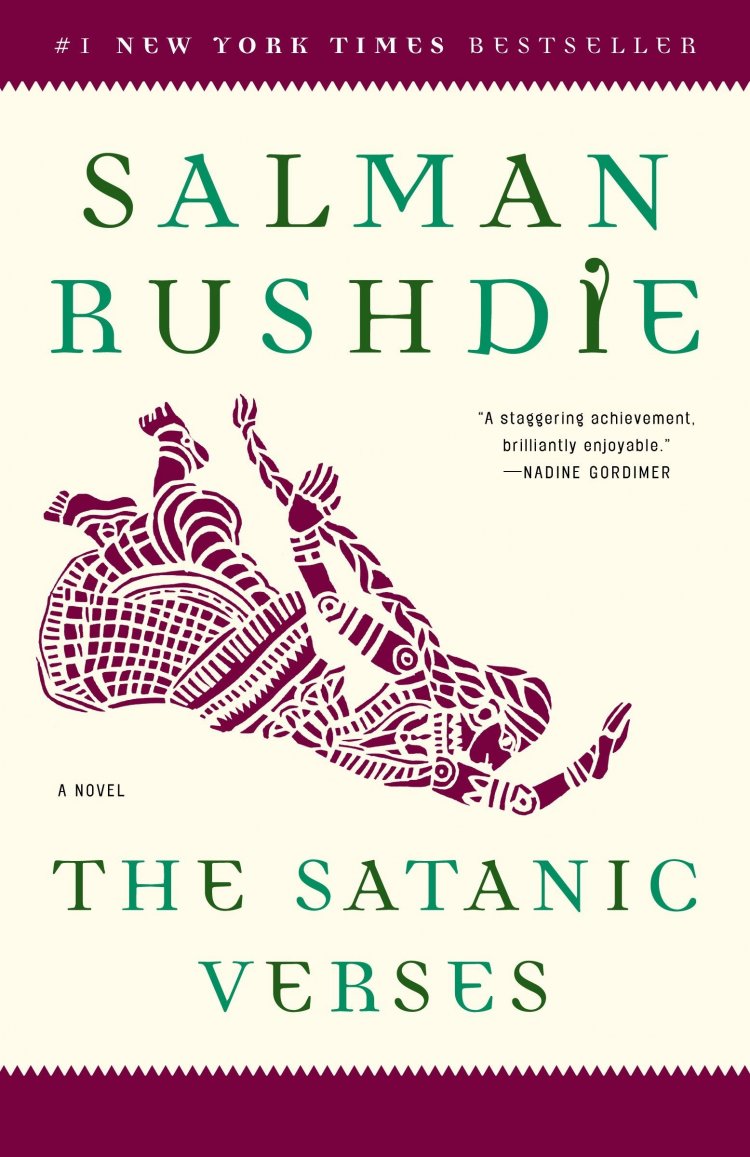The Satanic Verses

Rating: 3.7/5
Author: Salman Rushdie
Publisher: Viking Penguin; 26 September 1988 (UK), 22 February 1989 (US)
Publication Date: 1988
Language: English
Genre: Magic Realism
ISBN-10: 0812976711
ISBN-13: 978-0812976717
Format: Paperback
Pages: 576 pages
Plot:
The Satanic Verses consists of a frame narrative. The frame narrative, like many other stories by Rushdie, involves Indian expatriates in contemporary England. The two protagonists, Gibreel Farishta and Saladin Chamcha, are both actors of Indian Muslim background. Farishta is a Bollywood superstar who specialises in playing Hindu deities. The character of Farishta is partly based on Indian film stars Amitabh Bachchan and N.T. Rama Rao. Chamcha is an emigrant who has broken with his Indian identity and works as a voiceover artist in England.
At the beginning of the novel, both are trapped in a hijacked plane flying from India to Britain. The plane explodes over the English Channel, but the two are magically saved. In a miraculous transformation, Farishta takes on the personality of the archangel Gabriel and Chamcha that of a devil. Chamcha is arrested and passes through an ordeal of police abuse as a suspected illegal immigrant. Farishta's transformation can partly be read on a realistic level as the symptom of the protagonist's developing schizophrenia.
Both characters struggle to piece their lives back together. Farishta seeks and finds his lost love, the English mountaineer Allie Cone, but their relationship is overshadowed by his mental illness. Chamcha, having miraculously regained his human shape, wants to take revenge on Farishta for having forsaken him after their common fall from the hijacked plane. He does so by fostering Farishta's pathological jealousy and thus destroying his relationship with Allie. In another moment of crisis, Farishta realises what Chamcha has done, but forgives him and even saves his life.
Both return to India. Farishta throws Allie off a high rise in another outbreak of jealousy and then commits suicide. Chamcha, who has found not only forgiveness from Farishta but also reconciliation with his estranged father and his own Indian identity, decides to remain in India.
Review:
The theme that dominates the novel is ‘reincarnation’. The metamorphosis of Gibreel and Saladin into an angel and a demon communicates the same. These include Alleluia, whose life changes for the better after she climbs Mount Everest, and Mishal Sufiyan, who marries her lover and becomes a responsible adult after the deaths of her parents. Even, Saladin’s maturity that got upgraded towards the end of the novel was also a kind of transformation.
The treatment of ‘Miracles’ in this book is also interesting as how it has been handled. Ayesha controls butterflies; or the Londoners have dreams of Saladin as the Goatman. revealing that Gibreel is a diagnosed schizophrenic or that Ayesha hears the word of God through pop songs – he never fully discounts them. At the same time that Gibreel is mentally unwell, he is seen to levitate by several others. What it leaves for the readers is to figure out whether the magic in the book is meant to be ‘imaginary’ or is it supposed to be ‘real’.
The various other concepts that has been explored in this book include: Exploitation, Racism, Mental illness, Faith and Doubt.
Lastly, ‘Indian culture’ has been also discussed at lengths. The character ‘Saladin’ and the hindrances he faces with his ‘Indian identity’ over the course of his life time is one of the many focal points of the Novel. How one’s nationality connection should be implored is on the basis of one’s history, culture and traditions, circumstances and many personal experiences and unprejudiced opinions.
Controversy:
- The novel provoked great controversy in the Muslim community for what some Muslims believed were blasphemous references. They accused him of misusing freedom of speech. Pakistan banned the book in November 1988.
- On 12 February 1989, a 10,000-strong protest against Rushdie and the book took place in Islamabad, Pakistan. Six protesters were killed in an attack on the American Cultural Center, and an American Express office was ransacked.
About the Author:
Of Indian origin, Sir Ahmad Salman Rushdie born on 18 June, 1947 is one of the best living writers in English; combining historical fiction with magical realism. He is the author of twelve novels—Grimus, Midnight’s Children, Shame, The Satanic Verses, Haroun and the Sea of Stories, The Moor’s Last Sigh, The Ground Beneath Her Feet, Fury, Shalimar the Clown, The Enchantress of Florence, Luka and the Fire of Life, and Two Years Eight Months and Twenty-Eight Nights—and one collection of short stories: East, West. He has also published four works of nonfiction—Joseph Anton, The Jaguar Smile, Imaginary Homelands, and Step Across This Line and co-edited two anthologies, Mirrorwork and Best American Short Stories 2008. He is a member of the American Academy of Arts and Letters and a Distinguished Writer in Residence at New York University. A former president of PEN American Center, Rushdie was knighted in 2007 for services to literature.
The Satanic Verses, his fourth novel published in 1988, was banned in India and many Islamic countries. Facing death threats the author was granted protection in England. He moved to USA in 2000, where he currently lives.















































